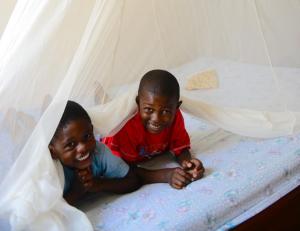A “One WHO approach” for Malaria elimination in the African Region
Brazzaville, 08 July 2019 - Although there has been progress in reducing malaria in Africa, most notably with the declaration of Algeria as malaria-free earlier this year, the disease is still the primary health problem in many countries.
“According to the last two annual World Malaria Reports, the pace of progress towards eliminating malaria in the World Health Organization (WHO) African Region is slowing. This is a cause for concern,” said Dr Matshidiso Moeti, WHO Regional Director for Africa.
The 2017 and 2018 reports provided a wake-up call for an appropriate response. They also generated global interest, bolstering existing high-level commitment to a malaria-free future by Africa’s leaders through the African Union, the Regional Economic Communities (RECs), and other continental/sub-continental political platforms.
“The Malaria programme has done a lot, but it is clear that changes are needed as malaria is still the primary public health problem in most countries,” said Dr Joseph Caboré, Director for Programme Management at the WHO Regional Office for Africa.
The solution, according to a group of malaria experts, lies in the implementation of a “One WHO approach to malaria in Africa”. The approach was the focus of the 2019 coordination meeting between WHO in the African Region and The Global Malaria Programme which took place in Brazzaville from 2 – 5 July and aimed to build synergies between operations in the different levels of the organization. The meeting brought together 30 WHOs malaria experts from ten countries in Africa with a high malaria burden, together with WHO headquarters, regional and inter-country Support Teams.
To implement the "One malaria approach", the expert meeting focused on sharing experiences with selected programmes and units in the Africa region. These included a presentation by the WHO health emergencies’ programme on “One WHO Approach to Health Emergencies”, as well as practical discussions with the Family and Reproductive Health, the Communicable Diseases and the Health Systems and Services’ clusters.
The presentations were opportunities to discuss integration, especially in the areas of health services delivery and health systems strengthening with disease control programmes as an entry point. It became clear to all concerned that there was a need for a comprehensive approach to the sick person and that health interventions should not be fragmented into programs.
This is a new way of working that will certainly benefit from the implementation of the WHO’s thirteen General Programme of Work (GPW13), which is guiding the institution work from 2019 to 2023.
Chargée de communication en appui aux pays francophones
Bureau régional Afrique de l’OMS
Email : asekpon [at] who.int (asekpon[at]who[dot]int)
Team Leader Malaria, Communicable Diseases Cluster, WHO Regional Office for Africa
Email: kalua [at] who.int (kalua[at]who[dot]int)
Tel: +47 241 39804
Communications Manager
WHO Regional Office for Africa
Email: okas [at] who.int (okas[at]who[dot]int)
Tel: +242 06 508 1009



